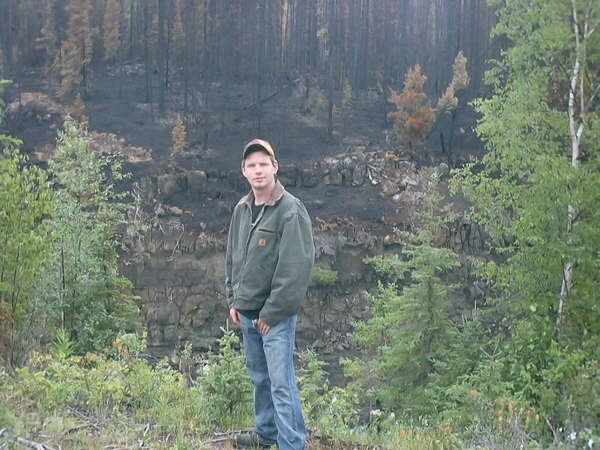
And justice for all?
January 27, 2007 in Opinion
I picked up the Vancouver Sun today and, as usual, paid particular attention to stories about the justice system. Here are two paragraphs that caught my eye:
“Former teacher Tom Ellison was sentenced Friday to house arrest for sex crimes against teenage students at Prince of Wales high school in the late 1970’s and early ’80’s” page A1
“The group of 16 protesters appeared stunned as B.C. Supreme Court Justice Brenda Brown sentenced Squamish elder Harriet Nahanee to 14 days for her part in disobeying a B.C. Supreme Court injunction telling protesters to stay away from [Eagleridge Bluffs] on May 25 of last year.” page B3
Hmm…I have spent more time in jail (five hours) than convict Tom Ellison will, and I wasn’t charged, let alone convicted, for anything at all.
As for 70 year old Harriet Nahanee, does punishment of 14 days in jail fit the crime resulting from the act of standing with others to try to prevent the blasting of a sensitive environmental area?
I would like to use this space to try to answer this question and explain these sentences, but my law degree and only 22 years of courtroom experience leave me ill equipped for the task.
posted by Cameron Ward
Police shooting inquest finally under way
January 20, 2007 in News

Kevin St. Arnaud
The first two days of the inquest into the police shooting death of Kevin St. Arnaud on December 19, 2004 have been completed. The two RCMP officers involved in the incident are scheduled to testify Tuesday morning, January 23rd, at the Vanderhoof courthouse. The inquest starts at 9:30 a.m.
Last Thursday, forensic pathologist Dr. James McNaughton testified that Kevin St. Arnaud, 29, was killed by three gunshots fired in a downward trajectory into his chest from a distant range. He said he could not comment on an expert reconstruction showing that the shooter’s likely standing position was between 2.9 meters (8 ft.) and 5.5 meters (18 ft.) from where the body came to rest. Dr. McNaughton said the trajectory was consistent with the shooter firing from a standing position with his gun at eye level if both he and the deceased were standing. Dr. McNaughton also testified that St. Arnaud had a blood alcohol level of .20%, indicating intoxication, but had no other drugs (aside from a small amount of aspirin) in his tissues or fluids.
Friends who were with Kevin St. Arnaud at a Christmas party earlier on the night of the shooting described him as being happy and as the “life of the party”. He was also described as being a gifted artist and intelligent and conscientious worker.
Another acquaintance, Mike Buckley, testified that St. Arnaud came to his home and woke him up after midnight. According to Buckley, St. Arnaud was very drunk and had one hand in a professionally wrapped bandage. When St. Arnaud refused to leave, Buckley said he would have used physical force against St. Arnaud, would have “laid into him”, but it wouldn’t have been right, since St. Arnaud was obviously drunk and had only one good hand.
Local resident Abe Klassen testified he saw a police officer chase a suspect into the soccer field, yelling “stop”. The suspect stopped, turned and threw both hands in the air in apparent surrender. A few moments later, Klassen heard two gunshots in quick succession. He next saw the suspect lying on the field and two police officers approaching him.
Police reported the shooting over the radio at 1:09 a.m. December 19, 2004. No weapons of any kind were found on or near St. Arnaud. The RCMP themselves investigated the shooting, as is B.C. practice, and no charges were ever laid. Observers cannot recall charges ever being laid against a police officer in British Columbia as a result of a fatal shooting.
A few months after St. Arnaud was killed, in another northern B.C. community, Houston, another unarmed young man was shot to death by an RCMP officer. The RCMP investigated the homicide of Ian Bush and no charges were laid in that case either. The mandatory inquest into Ian Bush’s death has not yet been held.
posted by Cameron Ward
As men, women and children die, Rice glares
January 13, 2007 in Opinion

There was some measure of satisfaction in seeing Condoleeza Rice glare at her Democratic inquisitors in Thursday’s hearings before the Senate Foreign Relation Committee. However, the Democratic inquisition is far too little, far too late. Where were they before March 20, 2003, the date Bush started bombing Baghdad? Where were they during Colin Powell’s embarassingly ridiculous dog and pony show at the UN, when he held up a vial of powder and spoke breathlessly about Saddam’s mobile weapons of mass production laboratories? The answer is, the Democrats were asleep at the switch.
I remember those days before March 20, 2003 very well, as I was but one of millions of ordinary people who took to the streets in demonstrations worldwide, naively hoping that mass public disapproval could stop the impending idiocy. Then, the Democrats and the American media were all supporting Bush’s insane decision to invade a sovereign Middle Eastern nation that posed no threat to the United States and, by all accounts, was a relatively peaceful place. Before March 20, 2003 there were no reports of scores of Iraqis dying in the streets, no reports of terrorist activity in Iraq whatsoever.
The Democrats’ belated opposition to Bush’s stupid and illegal war comes only because it is expedient now that they have regained some political power. It is far too late for the three thousand young Americans who have died, the twenty thousand or so who have been maimed and, though Iraqi lives are apparently much less important than American ones, for the sixty thousand or so Iraqi civilians who have died horrible and needless deaths.
Dr. Rice may indeed be glaring at her inquisitors, but she should be doing it from the dock, alongside Bush, Cheney, Rumsfeld and Wolfowitz. Some day maybe, there will be an effective international criminal court that will be able to deal effectively with politicians who unleash terror on civilian populations.
posted by Cameron Ward
Pieless in Vancouver: anatomy of a civil case
January 7, 2007 in Opinion
I have now had several days to digest the decision of the Supreme Court of British Columbia holding that my constitutional rights as a Canadian citizen were violated when the Vancouver police seized my car, strip searched me and held me in jail as result of an unfounded suspicion that I might throw a cream pie at the Prime Minister of Canada. Read the decision here.
The events of August 2, 2002, the day the incident happened, have changed my life and outlook forever. The entire odyssey has dramatically affected the way I perceive the justice system. Although I would not want anyone else to go through what I have endured in the last four and a half years, every police officer, lawyer and judge would benefit immeasurably from a similar experience.
I was a law-abiding citizen with no criminal record when the police confronted me and put handcuffs on my wrists, snatched me off the street, strip-searched me and put me in a 3’x6′ jail cell, with no furnishings whatsoever, for a day. They ignored my requests to call a lawyer and my questions as to why I had been arrested. Despite what the judge concluded, I categorically did not raise my voice before I was handcuffed, so I dispute that I “breached the peace”. After I was handcuffed, I shouted, not to attract media attention, but in the hope another citizen would intervene on my behalf and ask the police to explain themselves.
The day after the events occurred, I asked for an apology. When the VPD refused to apologize I lodged a formal complaint and then started a civil action. Following a police investigation, my formal complaint was dismissed as unsubstantiated. I tried to get the civil case dealt with in a summary one day proceeding (under our Rule 18A) and offered to abandon all issues other than the strip search, but the defendants argued that a full fourteen day trial was necessary. Their lawyers examined me for discovery over three days and the trial itself finally began in the fall of 2006.
Here are some of the fundamental things that have been driven home to me as a result of this experience:
Police can be arrogant and abusive towards citizens with relative impunity.
When an incident becomes the subject of a trial, what police officers testify happened and what actually happened can be very different indeed.
Given the propensity of judges to prefer the testimony of police officers over ordinary citizens, and given the powers police officers exert over suspects (refusing to let them call a lawyer, holding them for hours in a 3’x6′ concrete box), it’s very easy to see how false confessions can be extracted and how people can be wrongfully convicted.
The civil justice system is too slow and too expensive. It favours those with deep pockets and is out of reach for most ordinary people.
The police complaint system in British Columbia is utterly ineffective and needs to be reformed immediately.
What happened to me can happen to anyone unless all of us remain vigilant in demanding that our rights and dignity be respected by those who hold positions of power and authority.
posted by Cameron Ward
2006 Taser-related death toll: 65
January 3, 2007 in Opinion
Sixty-five more people died in North America after being Tasered by police in 2006, bringing the total number of such fatalities to 232. The Taser is a controversial “less than lethal” weapon that is designed to inflict excruciating pain and incapacitate subjects with 50,000 volts of electricity. Despite the number of Taser-related deaths, and the deaths of a number of animals as well, the manufacturer and law enforcement officials maintain the weapon is safe.







 Follow this site using RSS
Follow this site using RSS

